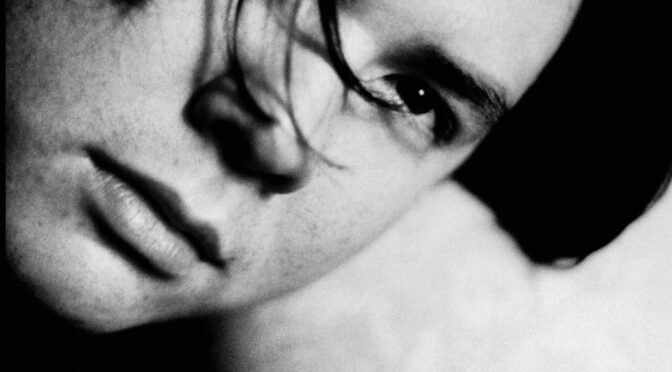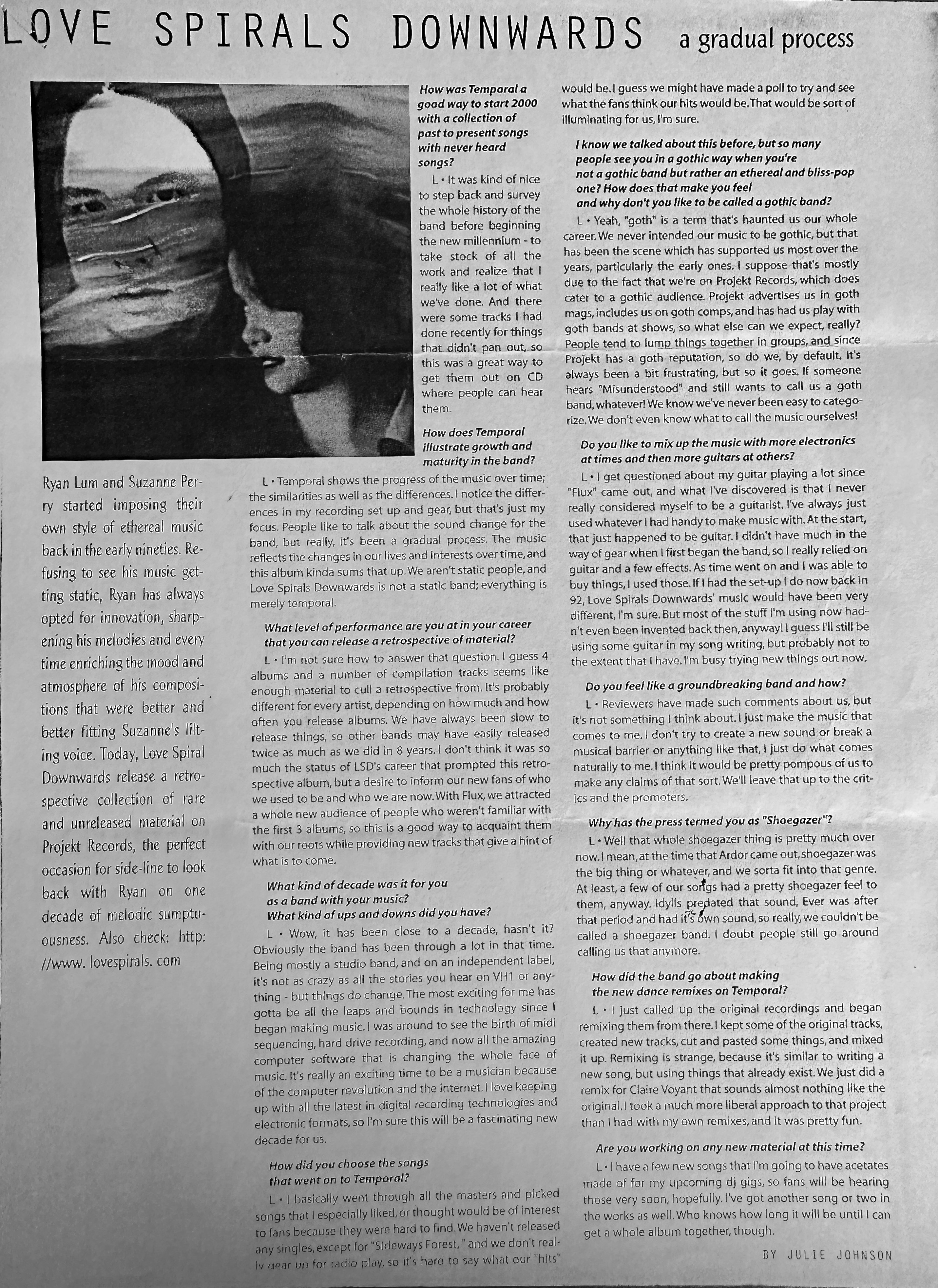Ryan Lum and Suzanne Perry started imposing their own style of ethereal music back in the early nineties. Refusing to see his music getting static, Ryan has always opted for innovation, sharpening his melodies and every time enriching the mood and atmosphere of his compositions that were better and better fitting Suzanne’s lilting voice. Today, Love Spiral Downwards release a retrospective collection of rare and unreleased material on Projekt Records, the perfect occasion for Sideline to look back with Ryan on one decade of melodic sumptuousness.
By Julie Johnson
Sideline: How was Temporal a good way to start 2000 with a collection of past to present songs with never heard songs?
LSD: It was kind of nice to step back and survey the whole history of the band before beginning the new millennium— to take stock of all the work and realize that I really like a lot of what we’ve done. And there were some tracks I had done recently for things that didn’t pan out, so this was a great way to get them out on CD where people can hear them.
Sideline: How does Temporal illustrate growth and maturity in the band?
LSD: Temporal shows the progress of the music over time; the similarities as well as the differences. I notice the differences in my recording set up and gear, but that’s just my focus. People like to talk about the sound change for the band, but really, it’s been a gradual process. The music reflects the changes in our lives and interests over time, and this album kinda sums that up. We aren’t static people, and Love Spirals Downwards is not a static band; everything is merely temporal.
Sideline: What level of performance are you at in your career that you can release a retrospective of material?
LSD: I’m not sure how to answer that question. I guess 4 albums and a number of compilation tracks seems like enough material to cull a retrospective from. It’s probably different for every artist, depending on how much and how often you release albums. We have always been slow to release things, so other bands may have easily released twice as much as we did in 8 years. I don’t think it was so much the status of LSD’s career that prompted this retrospective album, but a desire to inform our new fans of who we used to be and who we are now. With Flux, we attracted a whole new audience of people who weren’t familiar with the first 3 albums, so this is a good way to acquaint them with our roots while providing new tracks that give a hint of what is to come.
Sideline: What kind of decade was it for you as a band with your music? What kind of ups and downs did you have?
LSD: Wow, it has been close to a decade, hasn’t it? Obviously the band has been through a lot in that time. Being mostly a studio band, and on an independent label, it’s not as crazy as all the stories you hear on VH1 or anything, but things do change. The most exciting for me has gotta be all the leaps and bounds in technology since I began making music. I was around to see the birth of midi sequencing, hard drive recording, and now all the amazing computer software that is changing the whole face of music. It’s really an exciting time to be a musician because of the computer revolution and the Internet. I love keeping up with the latest in digital recording technologies and electronic formats, so l’m sure this will be a fascinating new decade for us.
Sideline: How did you choose the songs that went on to Temporal?
LSD: I basically went through all the masters and picked songs that I especially liked, or thought would be of interest to fans because they were hard to find. We haven’t released any singles, except for “Sideways Forest,” and we don’t really gear up for radio play, so it’s hard to say what our “hits” would be. I guess we might have made a poll to try and see what the fans think our hits would be. That would be sort of illuminating for us, l’m sure.
Sideline: I know we talked about this before, but so many people see you in a gothic way when you’re not a gothic band but rather an ethereal and bliss-pop one? How does that make you feel and why don’t you like to be called a gothic band?
LSD: Yeah, “goth” is a term that’s haunted us our whole career. We never intended our music to be gothic, but that has been the scene which has supported us most over the years, particularly the early ones. I suppose that’s mostly due to the fact that we’re on Projekt Records, which does cater to a gothic audience. Projekt advertises us in goth mags, includes us on goth comps, and has had us play with goth bands at shows, so what else can we expect, really? People tend to lump things together in groups, and since Projekt has a goth reputation, so do we, by default. It’s always been a bit frustrating, but so it goes. If someone hears “Misunderstood” and still wants to call us a goth band, whatever! We know we’ve never been easy to categorize. We don’t even know what to call the music ourselves!
Sideline: Do you like to mix up the music with more electronics at times and then more guitars at others?
LSD: I get questioned about my guitar playing a lot since Flux came out, and what I’ve discovered is that I never really considered myself to be a guitarist. I’ve always just used whatever I had handy to make music with. At the start, that just happened to be guitar. I didn’t have much in the way of gear when I first began the band, so I really relied on guitar and a few effects. As time went on and I was able to buy things, l used those. If I had the set-up I do now back in 92, Love Spirals Downwards’ music would have been very different, I’m sure. But most of the stuff I’m using now hadn’t even been invented back then, anyway! I guess I’ll still be using some guitar in my song writing, but probably not to the extent that I have. I’m busy trying new things out now.
Sideline: Do you feel like a groundbreaking band and how?
LSD: Reviewers have made such comments about us, but it’s not something I think about. I just make the music that comes to me. I don’t try to create a new sound or break a musical barrier or anything like that, I just do what comes naturally to me. I think it would be pretty pompous of us to make any claims of that sort. We’ll leave that up to the critics and the promoters.
Sideline: Why has the press termed you as “Shoegazer”?
LSD: Well that whole shoegazer thing is pretty much over now. I mean, at the time that Ardor came out, shoegazer was the big thing or whatever, and we sorta fit into that genre. At least, a few of our songs had a pretty shoegazer feel to them, anyway. Idylls predated that sound, Ever was after that period and had it’s own sound, so really, we couldn’t be called a shoegazer band. I doubt people still go around calling us that anymore.
Sideline: How did the band go about making the new dance remixes on Temporal?
LSD: I just called up the original recordings and began remixing them from there. I kept some of the original tracks, created new tracks, cut and pasted some things, and mixed it up. Remixing is strange, because it’s similar to writing a new song, but using things that already exist. We just did a remix for Claire Voyant that sounds almost nothing like the original. I took a much more liberal approach to that project than I had with my own remixes, and it was pretty fun.
Sideline: Are you working on any new material at this time?
LSD: I have a few new songs that I’m going to have acetates made of for my upcoming DJ gigs, so fans will be hearing those very soon, hopefully. I’ve got another song or two in the works as well. Who knows how long it will be until I can get a whole album together, though.


